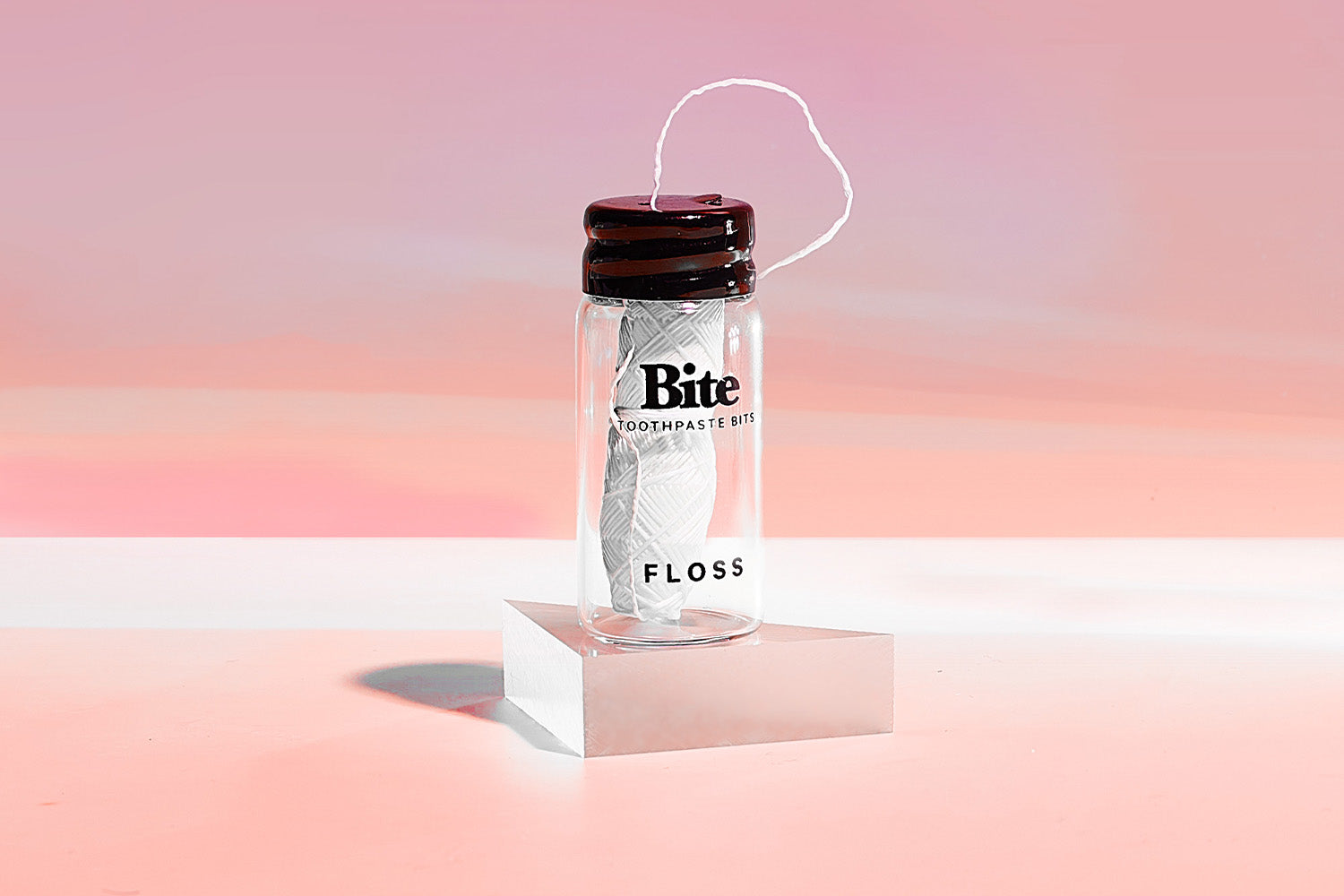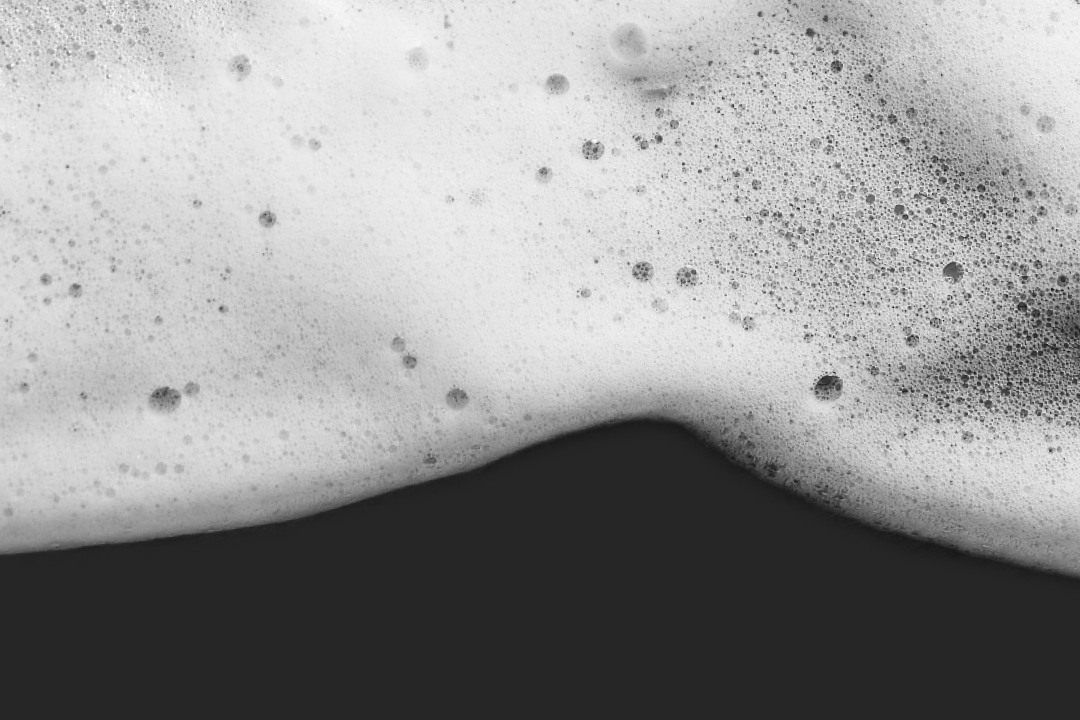Is Floss Biodegradable and Eco-Friendly?
Many of us have had the phrase, “Don’t forget to floss!” top of mind from a very young age. Often overlooked, flossing is crucial in maintaining an effective oral hygiene routine.
Unfortunately, most dental floss is made from plastic, damaging our environment and ecosystems. So, does plastic-free floss exist?
Keep reading to learn more about how eco-friendly floss is changing the oral care routine game and how Bite can help you incorporate plastic-free floss into your oral care routine.
What Is Floss Made Of?
Dental floss is an incredibly useful tool for getting into those hard-to-reach places in between your teeth to keep them free of bacteria and plaque, but what is floss made of?
Traditional dental floss is made from a material called nylon. You may be familiar with nylon since many synthetic fabrics are made from this material.
Nylon is a synthetic, plastic material used in clothing, car parts, thread and rope, and dental floss.
Nylon is widely used because it creates strong fabrics and threads that can resist wear and high temperatures as well, which is why many articles of clothing are made from this material. Using nylon to make floss also creates a product that is sturdy enough to glide between teeth without breaking or tearing.
Why Is Using Floss Important?
Using floss is an essential part of an effective oral care routine because, throughout the day, particles from foods like meat and fibrous fruit can get stuck in between your teeth and cause the growth of bacteria that turns into plaque.
What Is Plaque?
Plaque is a sticky substance that collects on your teeth and results from bacteria buildup in your mouth. You introduce bacteria in your mouth through activities like eating food, drinking sugary beverages, and not brushing your teeth regularly.
It is completely normal for plaque to build up in your mouth throughout the day. However, if plaque sits in your mouth too long, it can harden and turn into tartar.
Tartar not only affects your teeth, but it can affect your gums as well. The buildup of tartar can cause a range of issues for your teeth and gums, and one of these issues is gum disease.
What Is Gum Disease?
Your gums hold your teeth in place, and taking care of your gums is just as important as taking care of your teeth. Without proper care, bacteria and tartar can gather on your gums and cause gum disease.
Gum disease, or periodontal disease, is an infection of the gums caused by the prolonged buildup of hardened plaque or tartar.
If you have gum disease, you may have painful gums, sensitive teeth, or painful chewing, and any of these symptoms must be evaluated by a dentist.
Luckily, there are treatment options for gum disease that help keep the infection under control and offer relief of symptoms.
To avoid gum disease, brush your teeth at least twice a day, use mouthwash to wash away any bacteria that brushing alone cannot get rid of, and, you guessed it, don’t forget to floss!
What Is the Environmental Impact of Nylon Floss?
Now that you know the importance of flossing and what can happen when you do not regularly floss, you may want to rush to your bathroom to dig up the floss that is in the back of your medicine cabinet (you are not alone). However, using traditional floss has some serious impacts on the health of the earth.
First, floss is made from nylon derived from petroleum, a fossil fuel. Fossil fuels are those made from decomposed plant and animal matter.
When burned, fossil fuels emit carbon dioxide, a known greenhouse gas. Greenhouse gasses trap heat in our atmosphere and cause global warming.
Floss is also encased in plastic, the bane of the earth’s existence. Most plastic does not biodegrade, meaning it does not get broken down when discarded. If plastic does biodegrade, it can take centuries to break down.
When you pair nylon that can take up to 40 years to break down with a plastic container that can take hundreds of years to break down, this waste can sit in landfills for years or end up in the ocean, where this waste is consumed by sea life.
When our waste sits in landfills, it emits a greenhouse gas called methane — which is even more dangerous than carbon dioxide because it traps more heat in the atmosphere than carbon dioxide does.
When heat gets trapped in our atmosphere, this phenomenon causes global warming, a gradual increase in the earth's overall temperature. Because of global warming, ice caps are melting, water levels are rising, and ecosystems are being destroyed.
Regular floss is neither biodegradable nor eco-friendly, but is there a plastic and nylon-free alternative that can be?
Does Plastic-Free Floss Exist?
Luckily, there are alternatives to nylon floss that are much better for the earth, like silk.
When you think of silk, you may think of super-smooth silk fabric that is made into products like pillow cases, sheets, shirts, and dresses, but did you know that it can also be made into floss?
Silk is a type of fiber produced by silkworms that can be made into smooth and luxurious fabric. Silk can be made into floss because it is biodegradable and breaks down better than nylon and plastic.
Though silk floss may be a viable alternative to nylon floss, some people prefer not to use any animal products, and these folks do not have many floss options to choose from.
At Bite, we believe that everyone deserves options when it comes to personal and oral care. We also know that most oral care products are packaged in plastic, and this waste can add up.
In fact, there will be more plastic than fish in the ocean by 2050.
To combat this alarming estimation, we have harnessed the power of nature to create a collection of oral care products that are made with clean, vegan ingredients that are never tested on animals. Our products are also packaged with zero plastic to give you a clean mouth and a clean oral care routine.
Our floss is made with two ingredients: polylactic acid and candelilla wax — that’s it!
Polylactic acid is derived from lactic acid, is 100 percent biodegradable, and is coated in candelilla wax. Candelilla wax is also biodegradable and plant-based!
Our vegan floss is biodegradable and unflavored. It even comes packaged in reusable, recyclable glass vials with a metal lid designed to give you the perfect amount of floss each time.
Even better, we send you refills regularly that are packaged in compostable pouches so that you can eliminate waste the easy way.
Now, flossing is just one step in an oral hygiene routine, and at Bite, we are committed to providing you with a zero-waste oral care routine that will keep your teeth and gums healthy and strong, no plastic required.
Our Starter Kit comes with our Toothpaste Bits, Mouthwash Bits, our plastic-free floss, and we even include a bamboo toothbrush so that you can kick plastic to the curb for good (or maybe into a recycling bin).
Living a plastic-free lifestyle seems impossible in a world that is drowning in plastic, but with Bite, we make the switch to zero waste living easy for you.
The Bottom Line
At Bite, we understand that our choices and habits have both short and long-term consequences for the earth.
We also know that the choices we make are powerful and can have a positive or negative impact on ourselves, the people around us, and our environment.
The reality is that we only have one earth to live on, and we must do our best to change up how we do our everyday routines so that they do good for our bodies and the earth.
However, we also know that it is impossible to live a completely sustainable lifestyle in a world dominated by plastic.
We firmly believe that the small changes that we make every day to be more sustainable can come together and lead to something bigger, like using reusable shopping bags instead of plastic bags or using plastic-free floss instead of regular floss.
Switching up the products you use every day is a simple way to give back to the earth and to give your body cleaner, healthier ingredients. With Bite, making the switch to a zero-waste oral care routine is just one piece of plastic-free floss away!
Sources:
Periodontal (Gum) Disease | NIDCR
Plaque and Tartar on Teeth | National Library of Medicine
Floss/Interdental Cleaners | ADA
How Long Does It Take Garbage to Decompose? | NEIC
Petroleum | National Geographic
Biodegradation of Silk Biomaterials | NCBI


